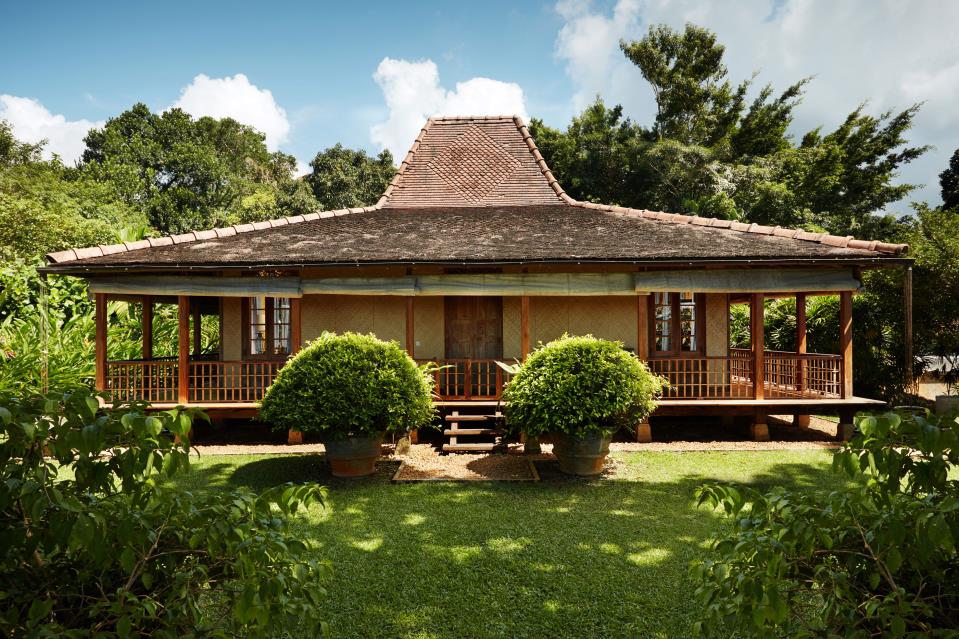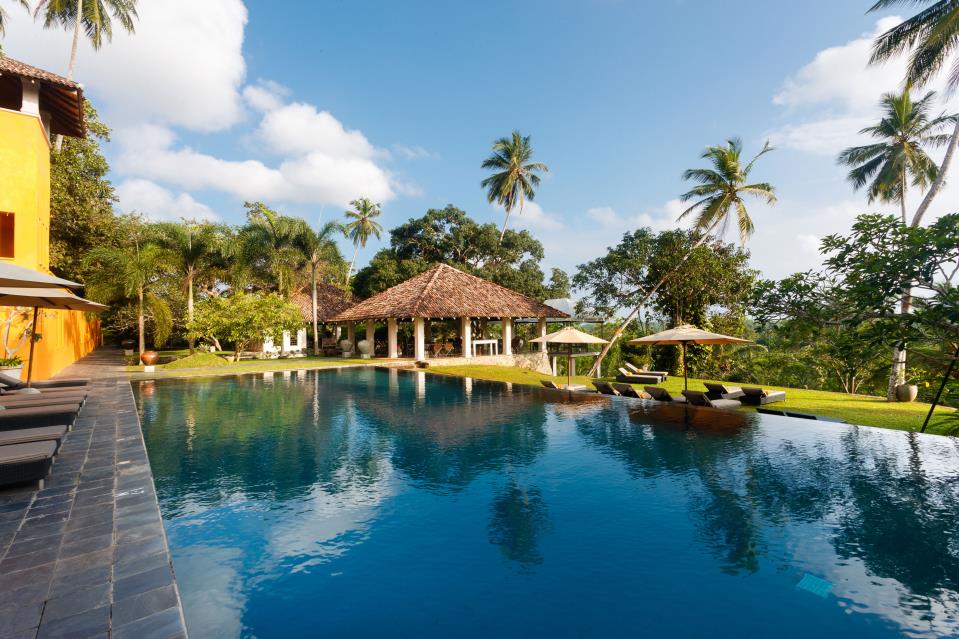It's heaven here. Deep in the jungle of Sri Lanka, the "teardrop of India" but only half an hour from pristine beaches and Galle that exotic walled city now a chic tourist hub.
We awaken every morning from a still, blissful sleep in this cool villa in its own walled garden and surrounded by small tea plantations, to the sound of chattering monkeys. They are either the grey- or black-faced langurs and very shy of humans but they do love a good screech. They are also voyeurs watching us from atop their tree. We also awake to strutting peacocks and the delightful chirping of a myriad of birds... Sri Lanka is also a "twitchers" heaven.
Occasionally Mungo, the hotel's Great Dane, will make a friendly good morning appearance by our pool with his younger and much smaller mate of unknown variety.

All this at www.Kahandakanda.com, the divine creation of Brit George Cooper, already a top international interior decorator based in London when 16 years ago he upped his stakes, packed his glamorous bags and settled in Sri Lanka and bought this land.
In doing so he created one of the island nation's top hotels with 12 private villas many with their own pools and all, as you can imagine, beautifully decorated with local and international fabrics. One minute you are sitting in an English country house setting and the next the decor becomes colonial high taste.
If you don't have a villa with a pool there's a massive central pool ideal for the daily "lengths". The plan is however to add more private pools to existing villas.
If you like the style of Kahanda Kanda and who wouldn't, entrepreneurial that he is, George has opened a huge KK emporium of household goods, fabrics and fashion in nearby Galle, the walled city on the sea.
Galle is perfect for mooching around on a leisurely morning. There are lots of cafes, witty places to have lunch and for shoppers there's diamonds, smells, fabrics, art and pottery.
Wander around the almost traffic free streets and immerse yourself in the Dutch gable architecture of this coastal town. For walkers you can walk the ramparts and enjoy the cool breeze.

Back at Kahanda Kanda a huge friendly team of Sri Lankan staff look after your every need. There's a small spa with a great masseur, Prageeth and the chef Prasad is superb; so you can be assured of menus both local and international. The food is very good.
When you tire of the jungle vibe take a Tuk Tuk, the main local transport to George's beach operation about half an hour away. The Tuk Tuk transfer is free and KK Beach with its 12 rooms all with spectacular ocean views is set on a vast and, when we went nearing the end of the pandemic, empty beach stretching to infinity. The crashing ocean waves are ideal we were told for surfing or if you prefer you can turtle watch. The beaches here are favourite places for nesting turtles to lay their eggs.
But no surfing or turtle watching for us and instead we retreated for a lunch of salad and local prawns dipped in coconut and those endless beach views.
Just before Covid Sri Lanka was named the No. 1 tourism destination and tourists, mainly English and German, brought in something like $3.3bn to the country with about two million tourists arriving.
Covid came after the terrorist bomb of 2019, not to mention the disastrous tsunami of 2004.
So Sri Lanka deserves a break and having just returned from a visit in February to escape the cold Mediterranean climate I can tell you that thankfully tourism is taking off once again. Hotels are still quiet so there are plenty of good deals but business is picking up.
Tea-terraced hills, leopards, although sightings of these very shy creatures are rare these days, elephants, jungle villages, Unesco sites, black bears... all await you and not to forget the work of the country's internationally-acclaimed architect Geoffrey Bawa. His work is well worth seeing in hotels, villas and public buildings up and down the country.
Visit the country sooner rather than later before the tourist hoards arrive once again particularly in the game parks which we avoided this time as a rare sighting of a leopard for example can result, blame the mobile phone, of a crush of 4x4s similar to Oxford Street on a sales day.
The British ousted the Dutch from Ceylon, as it was then called, in 1796 after a brief military operation. Having secured the coastal regions, they began to extend their influence into the interior and in 1815 became the first foreign power to occupy Kandy and control the whole island.
Unlike the Dutch the British were not satisfied simply to trade and soon established a plantation system of cinnamon, coconut and rubber and of course coffee and tea.
Heaven awaits you...